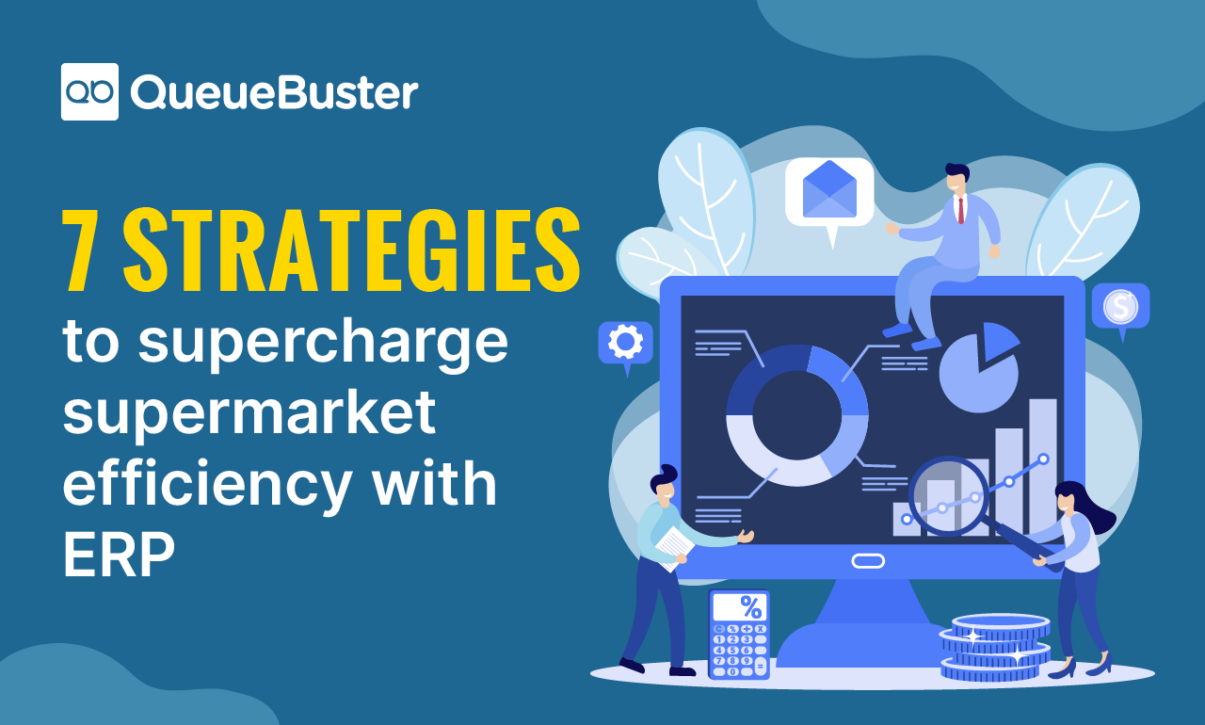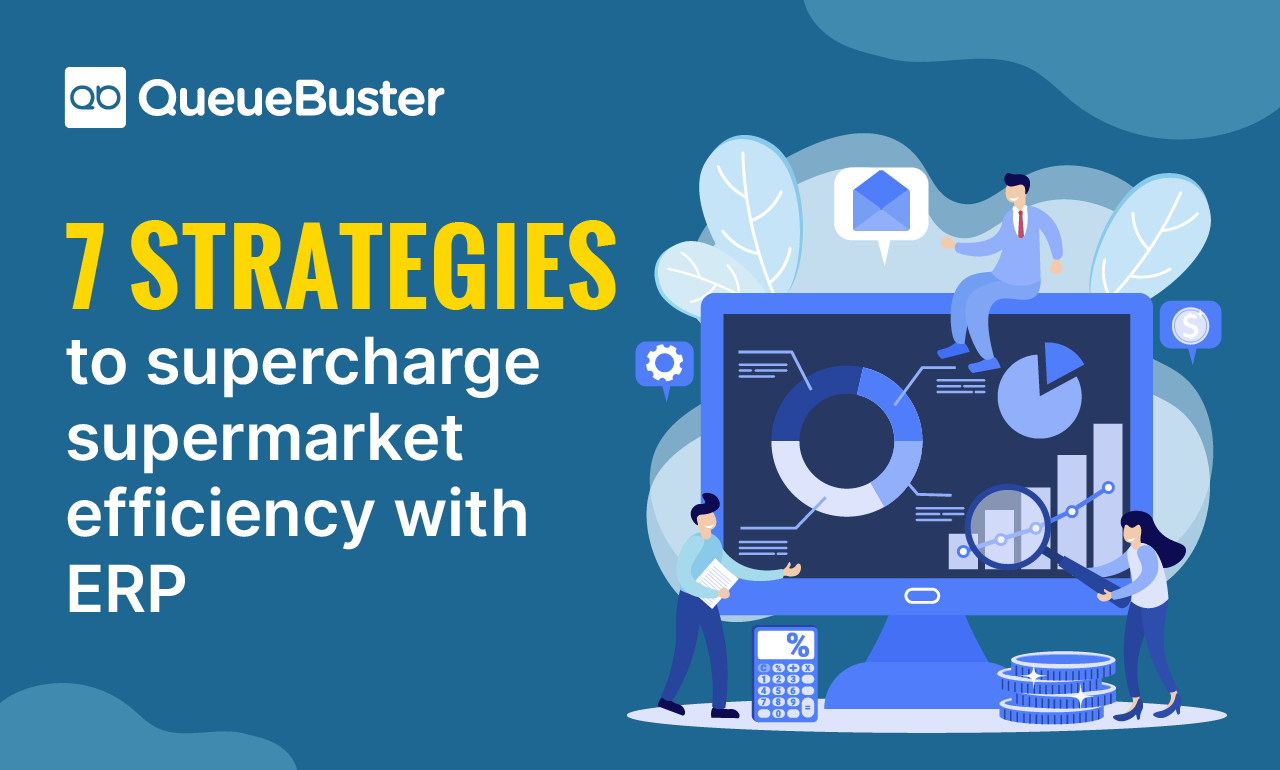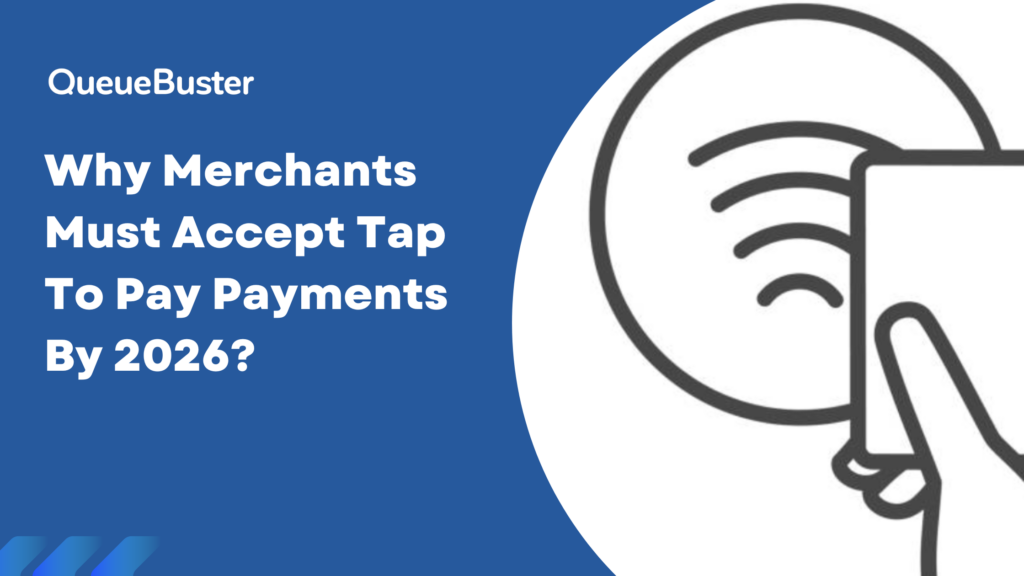
7 Proven Strategies to Boost Supermarket Efficiency with ERP Software
7 Proven Strategies to Boost Supermarket Efficiency with ERP Software

By QueueBuster Team Published: July 1st, 2024
Efficiency is critical in any business, and supermarkets are no exception. Whether you are a small corner store or a major supermarket chain, optimising your operations is crucial to staying competitive and profitable. One of the most powerful tools available to help streamline your supermarket operations is ERP software.
ERP (Enterprise Resource Planning) software can help you manage everything from supply chain management to inventory control and much more.
In this article, we will explore seven proven strategies for boosting supermarket efficiency with ERP software. From optimising your supply chain to streamlining your checkout process, these strategies are designed to help you maximise your productivity and profitability. So, whether you’re a small independent grocer or a large supermarket chain, read on to discover how ERP software can help you take your business to the next level.
Benefits of Using ERP Software in Supermarkets
ERP software has many benefits for supermarkets. Here are just a few of them:
- Better management of inventory and supplies
- Improved customer service and satisfaction
- Increased efficiency and productivity
- Better financial management and reporting
- Enhanced data analysis and reporting
- Streamlined operations and reduced costs
Error: Contact form not found.
By implementing supermarket ERP software, you can enjoy all these benefits and more.
Strategy 1: Inventory management
Inventory management is one of the most critical aspects of running a supermarket. With so many products to keep track of, it’s easy to lose sight of which items are selling well and which ones are not. Supermarket pos can help you manage your inventory more efficiently by providing real-time data on sales, stock levels, and orders. This data can help you make informed decisions about which products to stock and when to order them.

Furthermore, ERP software like QueueBuster can help you optimise your inventory by automating the ordering process. Instead of manually placing orders with suppliers, the software can automatically generate them based on preset inventory levels. This can save you time and reduce the risk of stockouts.
Strategy 2: Supplier management
Managing your suppliers effectively is critical to the success of your supermarket. ERP software can help you streamline the supplier management process by providing real-time data on supplier performance, pricing, and delivery times. This data can help you make informed decisions about which suppliers to work with and when to place orders.
Moreover, ERP software can help you automate the supplier management process by generating purchase orders and tracking deliveries. ERP software for supermarkets can save you time and reduce the risk of errors.
QueueBuster is one such POS software that allows an end-to-end solution for all your billing needs. It is a full stack POS software that aids their user with a devoted module, that deals with stock information and manages outlet level and other detailed reports of products and their real-time status.
Strategy 3: Sales management
Managing your sales effectively is crucial to the success of your supermarket. ERP software like QB can help you manage your sales more efficiently by providing real-time data on sales trends, customer behaviour, and product performance. This data can help you make informed decisions about which products to stock and how to price them.
Furthermore, ERP software can help you optimise your sales by automating the checkout process. Instead of manually processing transactions, the software can automatically generate receipts and track customer purchases. This can save you time and reduce the risk of errors.
Strategy 4: Customer relationship management
Customer relationship management is critical to the success of any supermarket. Supermarket billing software can help you manage your customer relationships more effectively, by providing real-time data on customer behaviour, preferences, and feedback.
This data can help you make informed decisions about which products to stock and how to market them.
Moreover, ERP system can help you automate your customer relationship management process by generating customer profiles and tracking customer interactions. This can save you time and improve the overall customer experience.
The first and foremost rule for retaining customers is appreciation. To retain a customer one must learn to appreciate them. Rewarding them with gifts, loyalty cards or any new offer helps businesses to create a space in the minds of their customers and build a solid customer base. With that being said, doing them manually can be confusing
Strategy 5: Financial management
Managing your finances effectively is critical to the success of your supermarket. ERP software can help you manage your finances more efficiently by providing real-time data on revenue, expenses, and profits. This data can help you make informed decisions about which products to stock and how to price them.
Furthermore, ERP software can help you optimise your finances by automating the financial management process. Instead of manually tracking expenses and revenue, the software can automatically generate financial reports and track cash flow. This can save you time and reduce the risk of errors.
Strategy 6: Warehouse management
Warehouse management is critical to the success of any supermarket. ERP software can help you manage your warehouse more efficiently by providing real-time data on stock levels, orders, and deliveries. This data can help you make informed decisions about which products to stock and how to organise your warehouse.
Moreover, a supermarket billing system can help you automate your warehouse management process by generating picking lists and tracking shipments. This can save you time and reduce the risk of errors. Apart from just being a powerful motivator in achieving targets for the business a POS also helps in finding the loophole. It suggests businesses where sales can be improved, areas where customer service can be improved and many others.
Strategy 7: Analytics and reporting
Analytics and reporting are critical to the success of any supermarket. ERP software can help you analyse your data more effectively by providing real-time data on sales trends, customer behaviour, and product performance. This data can help you make informed decisions about which products to stock and how to market them.
QueueBuster is a great place for all your business requirements. Collecting data from different departments and using it to make future decisions is an essential part of all retail stores. Many retail stores struggle with presenting their data in a single dashboard. Not only does storing them in a particular place helps to cut the unnecessary chaos but also eliminates the extra effort required by the backend team.
Moreover, supermarket pos software can help you generate reports more efficiently by automating the reporting process. Instead of manually generating reports, the software can automatically generate reports and track key performance indicators. This can save you time and improve the overall efficiency of your supermarket.
Conclusion
ERP software is a powerful tool that can help you optimise your supermarket operations and boost your productivity and profitability. By implementing these seven proven strategies, you can take your business to the next level and stay ahead of the competition.
Error: Contact form not found.
Whether you’re a small independent grocer or a supermarket chain, ERP software can help you streamline your operations, improve your customer service, and maximise your profits. So, what are you waiting for? Start exploring the world of ERP software today and take your supermarket to the next level! Book a free DEMO now with QueueBuster.
Popular Posts

MEWA India 2026: Showcasing QueueBuster POS to the Global Dry Fruits Industry
MEWA India 2026 was not just another industry event for us, it […]

Why Merchants Must Accept Tap to Pay Payments by 2026
The way customers pay has changed rapidly over the last few years […]